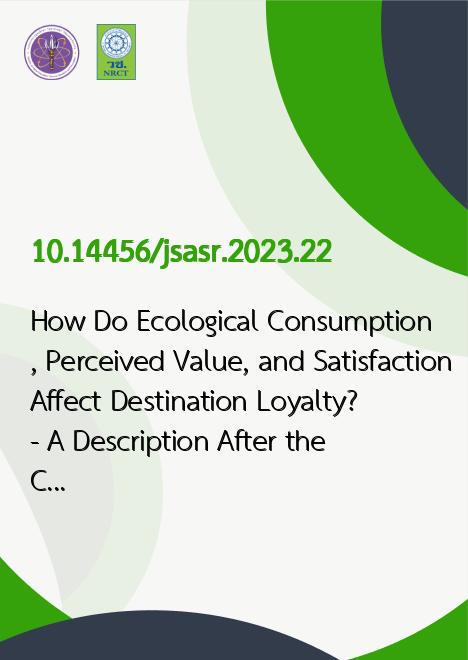
|
How Do Ecological Consumption, Perceived Value, and Satisfaction Affect Destination Loyalty? - A Description After the COVID-19 Pandemic of Thai Tourists in a National Park in Lampang, Thailand |
|---|---|
| รหัสดีโอไอ | |
| Creator | Pongsiri Kamkankaew |
| Title | How Do Ecological Consumption, Perceived Value, and Satisfaction Affect Destination Loyalty? - A Description After the COVID-19 Pandemic of Thai Tourists in a National Park in Lampang, Thailand |
| Contributor | Chatcharawan Meesubthong, Surakit Khumwongpin, Wiraporn Jeesorn, Pannaporn Phungjitpraphai |
| Publisher | DR.KEN Institute of Academic Development and Promotion. |
| Publication Year | 2566 |
| Journal Title | International Journal of Sociologies and Anthropologies Science Reviews |
| Journal Vol. | 3 |
| Journal No. | 2 |
| Page no. | 121-138 |
| Keyword | Ecological Consumption, , Perceived Value, Satisfaction, Destination Loyalty, Tourism, National Park |
| URL Website | https://so07.tci-thaijo.org/index.php/IJSASR/about |
| Website title | https://so07.tci-thaijo.org/index.php/IJSASR/article/view/2641 |
| ISSN | 2774-0366 |
| Abstract | Background and Aim: The recovery after COVID-19 in Thailand's tourism industry contributed to the country's economic expansion. As an alternative to the conventional economic perspective, sustainable tourism is growing in popularity. This study aims to identify how ecological consumption, perceived value, and satisfaction affect destination loyalty after the COVID-19 pandemic among Thai tourists in a national park in Lampang, Thailand.Materials and Methods: The conceptual foundation for this study was derived through analyses of the previous studies. The 500 questionnaires are used to collect data about the qualitative study of variables. The hypothesis of this study was examined by applying structural equation modeling.Results: The theoretical model was acceptable because it was congruent with empirical findings. For model testing, the following model fix congruence and goodness-of-fit indices were considered: chi-square=179.120, df=95, P=0.141, chi-square/df=1.888, RMSEA=0.047, RMR=0.028, GFI=0.984, AGFI=0.948, CFI=0.979. All hypotheses of research were accepted.Conclusion: The hypothesis model and empirical data of the structural equation model show that ecological consumption, perceived value, and satisfaction strongly influence destination loyalty following COVID-19 among Thai tourists in a national park in Lampang, Thailand. Government agencies in Lampang and Thailand must increase ecological consumption, perceived value, and satisfaction to increase visitor loyalty through the National Park Service. The paper provides empirical support for behavior theories that explain loyalty, emphasizing the importance of concepts such as customer satisfaction, loyalty, and engagement in determining visitor retention. |
